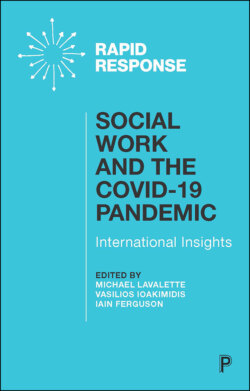Читать книгу Social Work and the COVID-19 Pandemic - Группа авторов - Страница 10
На сайте Литреса книга снята с продажи.
2 Why politics matters
ОглавлениеUnderstanding the biopolitics of COVID-19
Vasilios Ioakimidis
The term ‘biopolitics’ is not a recent addition to the lexicon of social and political sciences. It has been used since the late 19th century in variable and often contradictory ways. However, it was not until Michel Foucault’s famous series of lectures at the Collège de France in 1978 that the term was redefined in a way that it captured the critical intersection between state power and the control of people’s bodies. Since Foucault’s reconceptualisation, ‘biopolitics’ has come to describe the diverse ways our health, illness, bodies and human development have become contested political territories. A particular aspect of biopolitics is linked to state interventions, social control and the limits of individual liberty when it comes to decisions about one’s body.
Michel Foucault’s analysis demonstrated how the development of ‘public health’ policies in advanced capitalism do not necessarily prioritise the management and shaping of individual and collective attitudes towards a healthy society. On the contrary, if states are left unchecked, they have the tendency to enforce policies that aim at fully controlling the life and biological functions of human beings in ways that are disciplinary and moralistic. Two characteristic and recent examples of social control in the sphere of biopolitics relate to debates about women’s ability to access safe and legal abortion or the use of invasive medical procedures to determine the age of young asylum-seekers. In both cases, human bodies have become the terrain of disciplinary state intervention while at the same time significant mobilisation from social movements has confronted oppressive interventions on the human body.
The concept of biopolitics therefore offers a pertinent analytical framework for understanding the complex political dilemmas emerging from state action ‒ or inaction ‒ in the context of the COVID-19 pandemic. For the current pandemic, once again, demonstrates how biology and the interaction between humans and their physical environments are profoundly political and contested areas. Despite the consistent tendency of governments to reduce natural or human-made disasters to a-political and unpredictable phenomena, evidence indicates otherwise; natural disasters and pandemics are neither unpredictable nor do they affect all members of our society equally. Once again, during the COVID-19 pandemic, states were quick to use the supposedly unifying “we are all in this together” mantra in order to disguise the diverse experiences and vulnerabilities based on people’s socio-economic background. Notoriously, in March 2020 the UK Prime Minister Boris Johnson, putting forward an argument for relative inaction towards COVID-19 implied that as a society, “perhaps you could take it on the chin, take it all in one go” (BBC 2020). In his approach, Boris Johnson not only ignored the social determinants of illness, but he also confirmed, in the most emphatic way, that the management of COVID-19 is essentially political.
